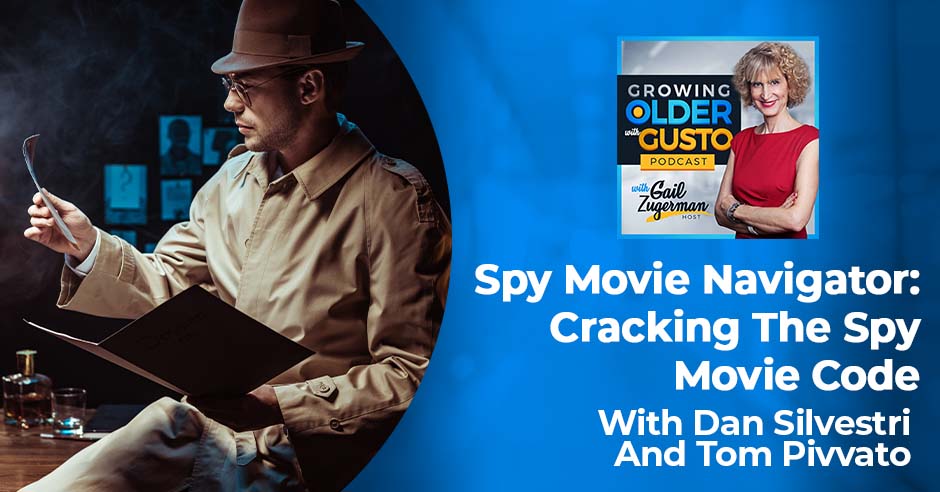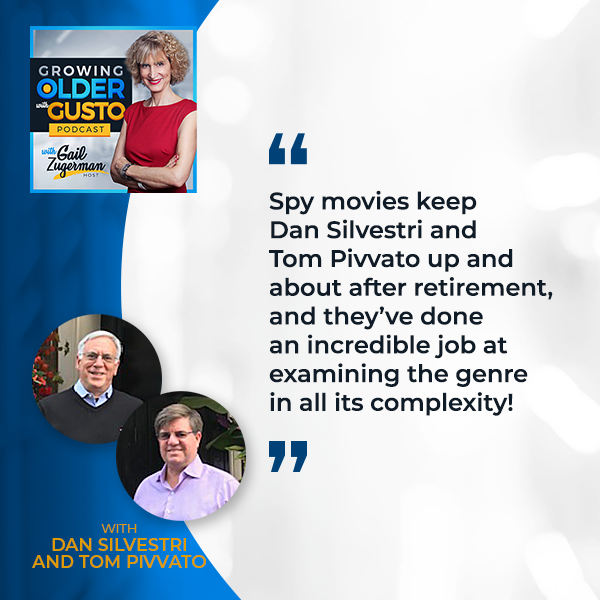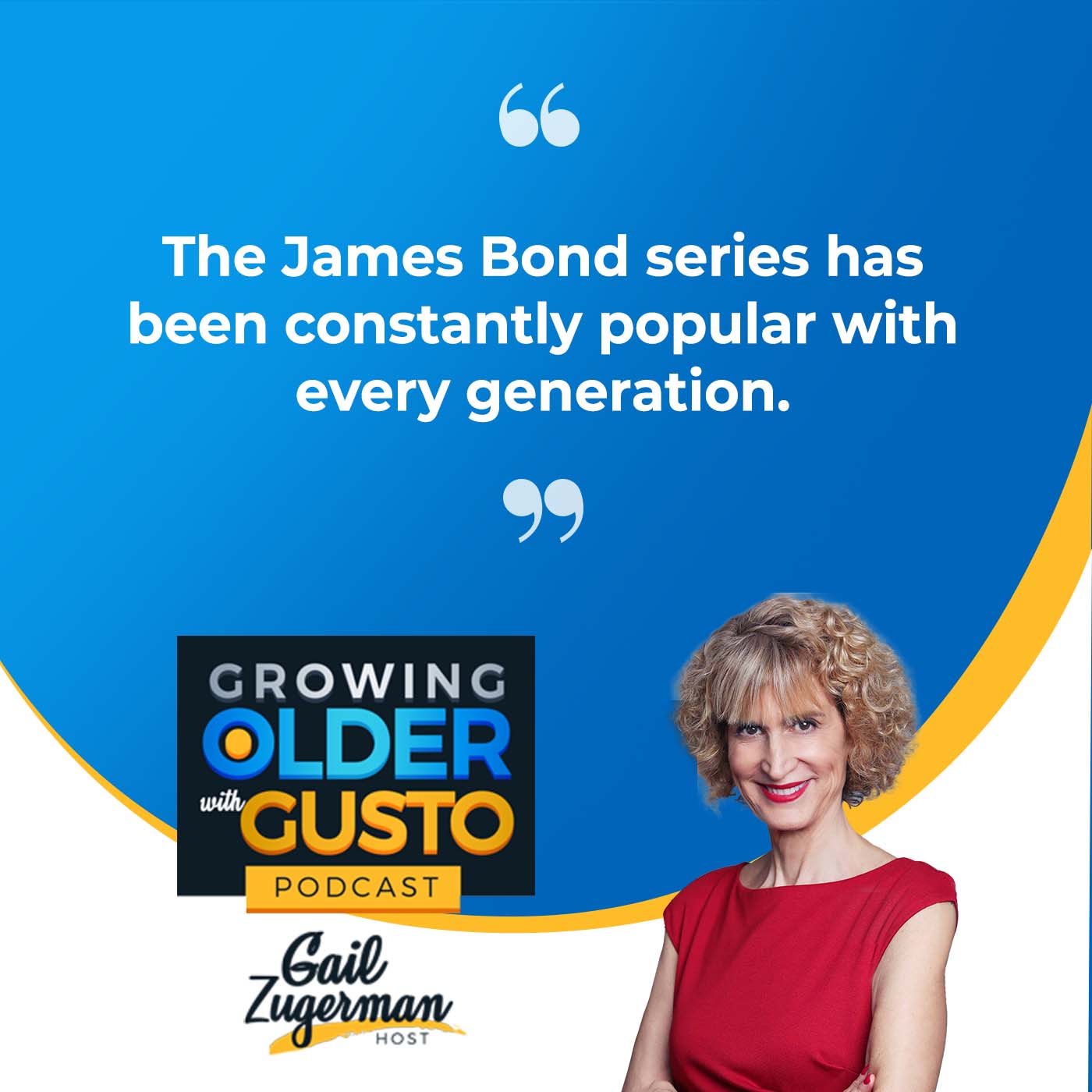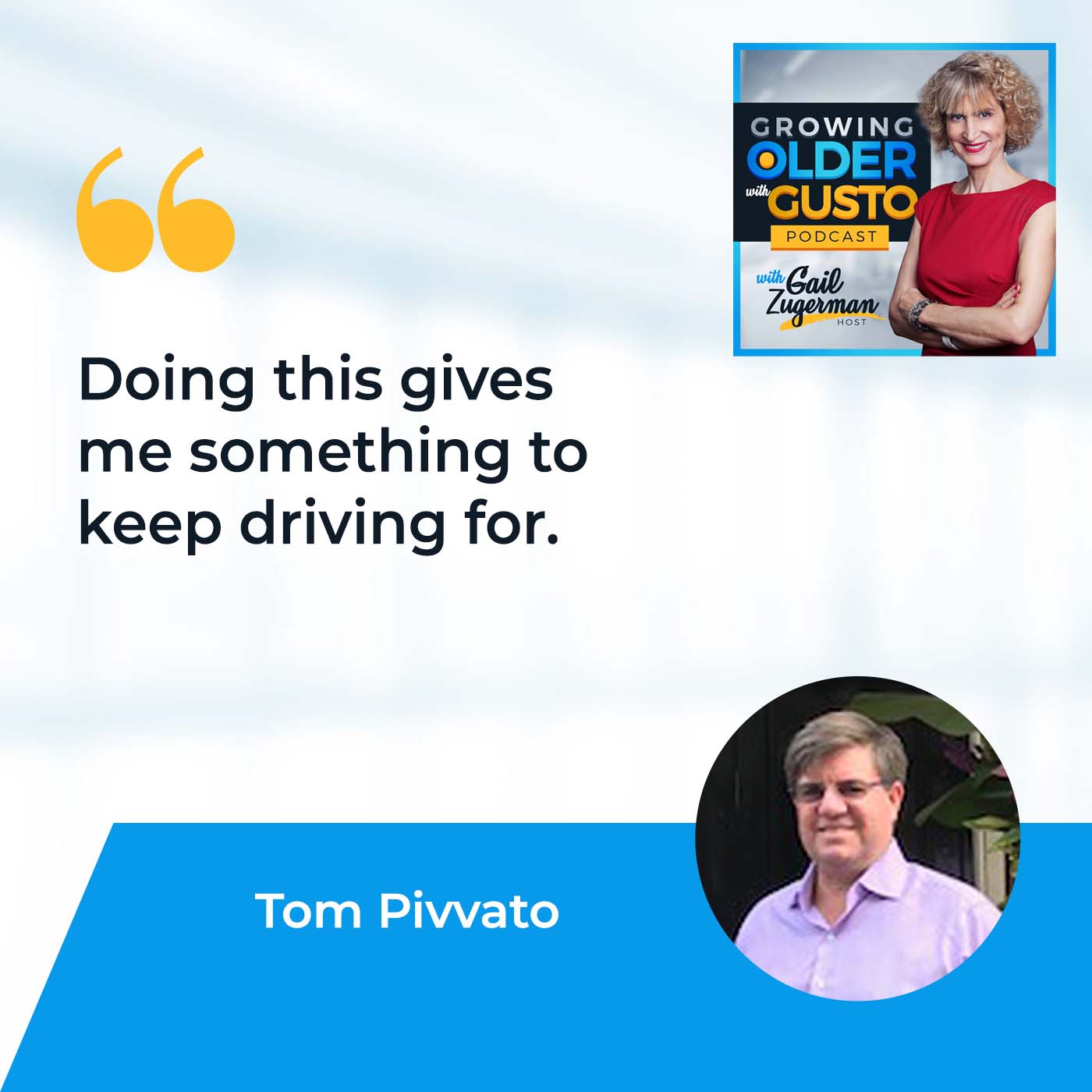
Who doesn’t love a good James Bond thriller? In this episode, our guests, after spending over 50 years in the high-tech business, decided they wanted to return to their passion. What is their passion? Their passion is spy movies. Dan Silvestri and Tom Pivvato did their research and they discovered that most sites are dedicated solely to James Bond movies. They kept exploring and found out by examining other spy movies that had been made that so many of them are interrelated. Their curiosity led them to discover things about the origins of spy movies, common themes, scenes that you see within different movies, and the influence each spy movie has on others in this genre. They started a podcast called Spy Movie Navigator, and this podcast is designed to enhance your viewing experience when you watch different movies. It was created as a landing pad for people interested in spy movies, from the classics to current releases. There’s so much to talk about in this episode so tune in!
—
Watch the episode here
Listen to the podcast here
Spy Movie Navigator: Cracking The Spy Movie Code With Dan Silvestri And Tom Pivvato
Who doesn’t love a good James Bond thriller? In this episode, our guests after spending over 50 years in the high-tech business decided they wanted to return to their passion. What is their passion? Their passion is spy movies. They did their research and they discovered that most sites are dedicated solely to James Bond movies. They kept exploring and found out by examining other spy movies that had been made that so many of them are interrelated.
Their curiosity led them to discover things about the origins of spy movies, common themes, scenes that you see within different movies, and the influence each spy movie has on others in this genre. They started a podcast called Spy Movie Navigator, and this podcast is designed to enhance your viewing experience when you watch different movies. It was created as a landing pad for people interested in spy movies, from the classics to current releases. There’s so much to talk about in this episode so let’s get started. Welcome to the show, Dan and Tom.
We’re very happy to be there.
Gail, it’s fantastic to be here. Thanks for inviting us.
I’m excited to talk to you and learn more about this passion of yours. First of all, tell the readers what ignited your passion for delving into the genre of spy movies.

I’ll go first on that one. First of all, we have a website called SpyMovieNavigator.com and the podcast show is called Cracking the Code of Spy Movies! It went back to high school. I was at St. Ignatius High School, and my friends and I decided when Goldfinger came out that we were going to cut classes and sneak downtown and go see Goldfinger. It was the third James Bond movie ever out. We had a system in the class where the teachers took a roll call and they put the names on a piece of paper. They clipped it outside the door and then someone would come and pick it up.
If your name was on the list, you were in the class. If it wasn’t, you were absent. A friend of ours, our mission was to go downtown and see Goldfinger. Our inside guy was going to put our names on the lists for each of our classes and everything was going to be great. We went downtown and saw Goldfinger. It was terrific. I went back to school the next day, and we were in detention. Our friend chickened out. We were in detention for about a week, but it was worth it. That’s got me started on the spy movies and James Bond in particular.
How about you?
For me, it was back in spy movies and the Columbo TV show. Columbo’s not a spy, but it got me going on the genre of it. However, when I looked at things like The Spy Who Loved Me, which was the first Bond movie that I saw in the theater, it was like, “This is different. I like this type of movie.” That helped me with that. Why we started delving into them other than being fans is that we were on a trip and we were up in Piz Gloria, which is this mountaintop retreat that was used in the movie On Her Majesty’s Secret Service. It’s gorgeous up there, and it’s like this remote little thing on top of a mountain.
Where is this located?
It’s in Switzerland.
It’s 10,000 feet up.
It was above the town of Mürren. Dan and I were sitting in the bar that night and we’re like, “We liked it so much. There’s got to be other people who would like this.” We started looking into, “Can we do something around this?” I was thinking at that time about retirement and looking for something to do, and we were like, “Can we do something here?” A few years later, here we are and having a heck of a good time.
Tell us about what are the origins of spy movies. You mentioned Columbo. I would think of Columbo off the top of my head or Goldfinger. I think it was one of the first James Bond movies I saw. What are the origins of spy movies? As you did your exploration into this genre, what did you discover?
When you look back on spy movies, everyone thinks of James Bond. Ian Fleming wrote all the novels and stuff starting in 1953 but if you look back on spy movies, they’ve been around for decades before that. You go back in the history of spy movies, you look at the 1935 Alfred Hitchcock movie, The 39 Steps. Many people consider that to be the first official spy movie. There were a few before that. It was a silent movie too, as well.
I was going to ask about that. If there were any silent movies.
I’ll talk about one of those. It’s one that I like better than Dan does.
As I said, there were a few others before that. The 39 Steps though was the birth of the more modern concept of what a spy movie is. A lot of the elements that we see now in spy movies from that point forward came from the roots of these older spy movies like The 39 Steps in 1935, Secret Agent, which was also a Hitchcock-directed movie in 1936 and others liked. Those began the real spy movie genre back in the ’30s.
What was the Doris Day movie where she sang Que Sera, Sera?
The Man Who Knew Too Much.
It was both a 1934 version and a 1956 version of that. He was in the 56th version of that but Hitchcock did both of them.
I also think that influencing spy movies, World War I and World War II played a big role.
In what way?
It’s because a lot of the early spy movies were around spying on your war enemy. There was a lot of influence there. The first spy movie that I know of is something called Spione. It’s a German silent movie by Fritz Lang. It being silent is nice because they can put up English subtitles there, which is nice.
What year did that come out?
That was a 1928 movie. You can find it online on YouTube. There’s a version out there by BluRay Classic Studios. It’s a pretty good print of it. There are some that are tough prints, but that one’s a pretty good one. We see many of the tropes used in that movie used in future movies even though this was a silent movie. You also have The 39 Steps that Dan talked about. By the time he got to that, the formula was there in terms of getting us into what a spy movie should look like or what the industry thinks it should look like.
Tom mentioned the spies, World War II, and the World Wars. There’s a movie coming out now. It’s The Ministry of Ungentlemanly Warfare, and that is based on a real World War II Operation, Operation Postmaster. We already saw it.
When you first started getting together and getting your ideas together, how did you discover that certain spy movies or themes are interrelated? What was your take on that? Why do you think that is?
I think a couple of things. Spies, like Ian Fleming, for instance, he was an internal intelligence officer for the British. He was a naval intelligence officer. He knew a lot of stuff that was going on. As a matter of fact, he was involved in many of the operations that were executed in World War II. The concept of what goes into real spying worked its way into the movies for sure certainly because of Fleming and how he popularized spies. However, it’s the real-world element I think that influenced what went into spy movies.
Absolutely. Also, trains, Dan.
Every spy movie has got to have a train.
The early spy movies all had train scenes, and now almost every spy movie has a train scene in it. Many with a fight on the train which is pretty interesting.
The greatest fight of all on the train was From Russia with Love.
You see something like that and it influences the next movie out. Also, other things like there’s a mole in the organization. Hitchcock called it MacGuffin, where you have an object that people are going for. What it is doesn’t matter. It’s the mission of getting that whatever it is, that MacGuffin. Hitchcock started that and everybody started using that.
It’s another tool that Hitchcock used. I was going to ask you. You saw that in other spy movies. Does he always appear in every movie?
Yes, he did.
In some form.
Yes.
Did other people copy him or not?
Yes.
They did.
A little bit here and there, but not as much as Hitchcock, I don’t think.
Is Michael G. Wilson a producer or owner? He’s one of the two guys that owns Eon Productions.
He produces the James Bond movies.
Since he started working on them, I don’t know one that he’s not in. I think he’s in all of them.
He’s not in all of the early ones, but he’s in certainly the later ones.
He started working.
He does that. He makes a little cameo. It has been done. Hitchcock though, when he did it, he started putting himself in earlier in the movies because people were so distracted looking for him that they weren’t paying attention to the movie.
I think one other influence that I wanted to make sure I talked about here is real-world spy stuff. Real-world espionage tasks. Things like something called a brush pass where you two people pass and they hand something off. It’s so fast you don’t even see it or a dead drop where they put something somewhere or a predetermined place and somebody else comes by later and picks it up. As things change in the real espionage world, some of that stuff ends up hitting into the real spy movies. The real-world espionage world is influencing what we see on screen.
Do you think there are ebbs and flows to the audience’s interest in this genre? Does it change according to world events? You mentioned world events do play into the development of these spy movies. Does what’s going on in the outside world have any impact on the interest in the genre?
I think, absolutely especially in Eon Productions, the people who produce the James Bond movies. They are constantly looking at what’s going on in the world for their movies because they’re out of Fleming material. Fleming wrote about thirteen novels and short story collections. They’re out of Fleming material for the most part.
They’re always constantly looking at what’s going on in the real world, what’s the influence of that on the global perspective of country versus country, and so on. Also, spy versus spy. That makes a lot of sense for them to do. Also, the people who are familiar with it, they’re going to be more interested in that. It’s smart business to do it, but it’s certainly a good source of information for them to do the screenplays and write new material.
I also think the whole ebb and flow thing comes into play with things like the Cold War. There were a ton of spy movies and they had to shift after the Cold War “ended.” How espionage was done is still all there, but it’s not as big of a thing in people’s minds as when we were very heavily involved in the Cold War. As the world events happen now, I’m going to bet we’re going to see more Russian and Asian spy conflicts happening here and that will be a very big influence on the industry.
That leads to the next question that came top of mind. Are spy movies in different countries different than ones that originate in the United States or do they play off one another? Do they copy or is there something common depending on which country they’re produced in?
We did one on Raazi, which was produced in India. Again, I think you have a subset of themes that are in spy movies, and it’s oftentimes country versus country for one reason or another. In this Indian movie, it was the Indian-Pakistani War during that timeframe. Again, they’re going to frame it from their Indian perspective and what a spy organization looks like for India versus Britain, the United States, or whatever.
However, that was a very interesting movie because now you’re seeing their perspective of their battle basically with Pakistan. They did a fair job of presenting both sides evenly. It’s going to be different from each country, but it’s going to be their perspective that brings it to the film but still this subset of tropes, standards, and things that happen in the real spy world that are going to be used over and over again.
Also with India, though, Dan, there’s a different formula in India for doing a movie. Most of the movies that are over two hours long get an intermission. It’s Bollywood-based, there’s a dance break in the middle of the movie with a song. Even if you don’t have the dance break, they’ve got musical interludes where they advance the story without dialogue. It’s just whatever the lyrics to the song are and not the actors talking.
The style is different, but the concepts are going to be very often similar. If you take a look at the Chinese movie Cliff Walkers from a few years ago where you take Pathaan, which was another Indian movie. It’s us versus them, whoever them is, whether it’s a country or another organization and we’ve got to stop them from doing something bad. That’s very common across all of the movies that I’ve seen across all the different nationalities.
In Raazi, when they were smoking, they put a flash-up on the screen saying, “Smoking kills.” They do some things differently.
What other influencers would you say play into the spy genre?
I think you have a lot of things. We were talking about the real world that influences what goes in but you also have spy movies that influence other spy movies. Those are the kinds of things that I think we look at. This one we did was on The Ministry of Ungentlemanly Warfare. We looked at maybe 4, 5, or 6 other movies that you can reference within that movie that you could say, “This kind of thing was going on in this movie or that movie,” and so on. I think that’s a big influence. What happens in one spy movie, if it’s successful, you will see it over and over again like the train concept that Tom was talking about in future spy movies. That’s a biggie.
One example of things coming from the real world was from the Goldfinger movie in 1964, when James Bond in the pre-title sequence comes out of the water in a wetsuit. He’s going to go into this area and blow up some stuff he needs to blow up. He’s in a wetsuit, but he unzipped it and he’s in a tuxedo so that he looks like he fits into his atmosphere. You’d think, “This could never happen in the real world, and this is just fantasy stuff.” However, it did happen in the real world in World War II.
There was an operation in the Netherlands where a specially made wetsuit was made for this diver. He was to go in and extract a couple of prisoners from this German mansion, and he was going to fit in because he had the tuxedo on and be able to walk right in and do this. It happened in real life. It’s that kind of stuff constantly they’re looking for. Tom and I look for that in these movies and bring that out because a lot of people would not pay attention to that kind of thing. We’re bringing these different elements out to the movies, but they’re big influencers in what happens in the movies.
I think the times matter a lot too. When we talked about the Cold War, there were a lot of things. If you think about something like Star Wars, it wasn’t a spy movie, but it had a very direct influence on the James Bond movie Moonraker. Bond used to smoke cigarettes. He doesn’t do that anymore. The womanizing has been brought way down and now, the next thing we’re seeing in spy movies is the topic of artificial intelligence.
Many people don’t know what it means so in the movies that makes it be anything they want, and totally ridiculous. I think it’s going to be overplayed. We saw it in the last Mission Impossible movie, and it didn’t make a lot of sense to me. I understand that stuff a bit. The other thing is you see influences on what was successful in another movie, maybe not on a specific, “We were on a train and had a fight,” but action sequences have gotten bigger and bigger.
They keep trying to outdo the last movie with an action scene and stunts. It’s raising the budgets to an almost unsustainable level. I think it’s going to be interesting to see how that calms down because if you look at something like The Ministry that we talked about or Raazi, there are not as many of those big action scenes in them but the industry was trying to one-up each other for quite a while there with the stunts mainly in spy movies and that’s not really about the espionage. That’s just about how a spy movie is made.
That’s what’s going on now, and it’s been going on for several decades. It’s the battle between espionage for spy movies. We’re talking about espionage and real espionage life happens in From Russia with Love versus action movies, which many of the Mission Impossible movies are. The producers are constantly looking at what selling and they’re making those adjustments. If action is selling, their spy movie is more action-oriented than espionage-oriented. That’s a constant battle, and it changes over time. It also changes from country to country. It is a battle for the producers to try to figure out what to do next but it has been a battle between those two elements, espionage and action for decades.
They say timing is everything and I know that the James Bond series has been constantly popular with every generation. Let’s talk a little bit about that. Is that sustainable or is there any other competition to James Bond that has been as successful?

I think James Bond, it’s been around since 1962 for movies. It was in 1953 when Ian Fleming started writing Casino Royale. It’s been around for over 60 years. Is this sustainable? It looks like it. They’ve done a good job so far. Will it continue to be sustainable? Everyone’s waiting to see what their next decision is because Daniel Craig is no longer James Bond. That’s been since 2019. That’s been out and nothing’s been done since. People are wondering what’s going to happen next. It’s a challenge, but I think they’re going to continue to try to produce it. They do get new and younger people interested. They must or else the older people are not going to be around to watch the new movies.
It’s interesting how all the different generations enjoy it and flock to those movies.
If you ask somebody who their favorite James Bond actor is, it’s likely to be whoever they saw first in the role. I mentioned that these things change over time and adapt to time. If they were putting out some of the womanizing stuff that happened in the early Bonds, they might not get the audiences now. Their ability to adapt is extremely important.
It’s a must for the money or just to be successful.
If you look at other series that have tried to take on Bond, you had Bourne, which was a very good probably first two movies, and then it tapered off. You had Mission Impossible, which is still very strong although they’re at a critical point now with Ethan Hunt and Tom Cruise playing Ethan Hunt. Now, the nice thing with Mission Impossible is the team members come and go so they could easily say, “It’s not Ethan Hunt. We’ve got a new head of whatever the team is.” With the Bond movies, it’s harder for them to do that. They have to say, “Here’s a new actor and we’re going on our merry way.”
Mission Impossible is the franchise that has any chance of competing with the James Bond franchise. You look at that by Box Office numbers, and they’re the only ones who compete globally versus James Bond. James Bond is a global phenomenon, and so is Mission Impossible. Many of the other franchises that are trying. They even tried Harry Palmer in the mid-’60s, and that was based on Len Deighton’s books and so on. They did three of them and that was the end of that. It’s very difficult to do, but Mission Possible probably is in the best position to challenge the Bond franchise.
With streaming, there are a lot of companies trying. Netflix has put out a bunch of things that they’ve said, “This is our answer to go after Bond. We want this to be a series like Bond.” You had the Kingsman.
We are watching A Gentleman in Moscow right now.
This series happens, but nothing stuck as well as Bond.
Let me ask you this. How did your background in high tech play into, if in any way, your passion for the spy genre? Did it have any influence or was that something that was different for you when you wanted to pursue that?
I’ll let Tom talk about that because his background is high-tech. Mine is sales and marketing. I have a sales and marketing angle too.
For me, I got hooked on Bond in high school.
Gentlemen, we are running out of time, I’m sorry to say but tell me quickly how did this interest come after retirement and how has it helped you? You’re growing older with gusto, you’re passionate about this, and you have so many interesting things to talk about. In one sentence, tell us how this interest has helped you after retirement.
Everyone wants to retire and when they get there, they’re bored. I think before you retire, you need to know what you’re going to do. If you’re going to be traveling half the year, great. If you’re going to write a book, great. Tom and I are doing this because it keeps your mind and body moving. It keeps you thinking and it keeps you moving forward. You have to have something to do after you retire. This is a productive entertaining thing. We’re in the entertainment business so we’re trying to entertain people.

For me, all I would add that is my wife gave me the guidance before I retired that I needed to have something specific to do. She was right and this ended up being a perfect opportunity for me. I get to keep my technical skills going a little bit with what I do. I enjoy doing the spy movie, so it gives me something to keep driving for.
How can our readers find you and find your podcast?
We have a website, SpyMovieNavigator.com. Our podcast show is called Cracking the Code of Spy Movies! It’s also a YouTube channel with the same name. We’re in every major podcast app like Apple, Overcast, and everything. Every one of them, we’re in. You could go to your podcast app, look for Cracking the Code of Spy Movies, and start listening. We appreciate it.

Thank you, readers. I’m sure you enjoyed this episode. Please share it with your friends, and remember to stay curious and stay connected.
Thank you very much.
Thank you, Gail.
Important Links
- SpyMovieNavigator.com
- Cracking the Code of Spy Movies!
- YouTube – Cracking the Code of Spy Movies
- Apple – Cracking the Code of Spy Movies
About Dan Silvestri and Tom Pivvato
 Dan & Tom get together through a mutual interest in spy movies. This catapulted into their developing spymovienavigator.com and Cracking the Code of Spy Movies. Passionate about spy movies leads to a third act for Dan & Tom. They took a deep dive on the subject and created Cracking the Code of Spy Movies.
Dan & Tom get together through a mutual interest in spy movies. This catapulted into their developing spymovienavigator.com and Cracking the Code of Spy Movies. Passionate about spy movies leads to a third act for Dan & Tom. They took a deep dive on the subject and created Cracking the Code of Spy Movies.


0 Comments